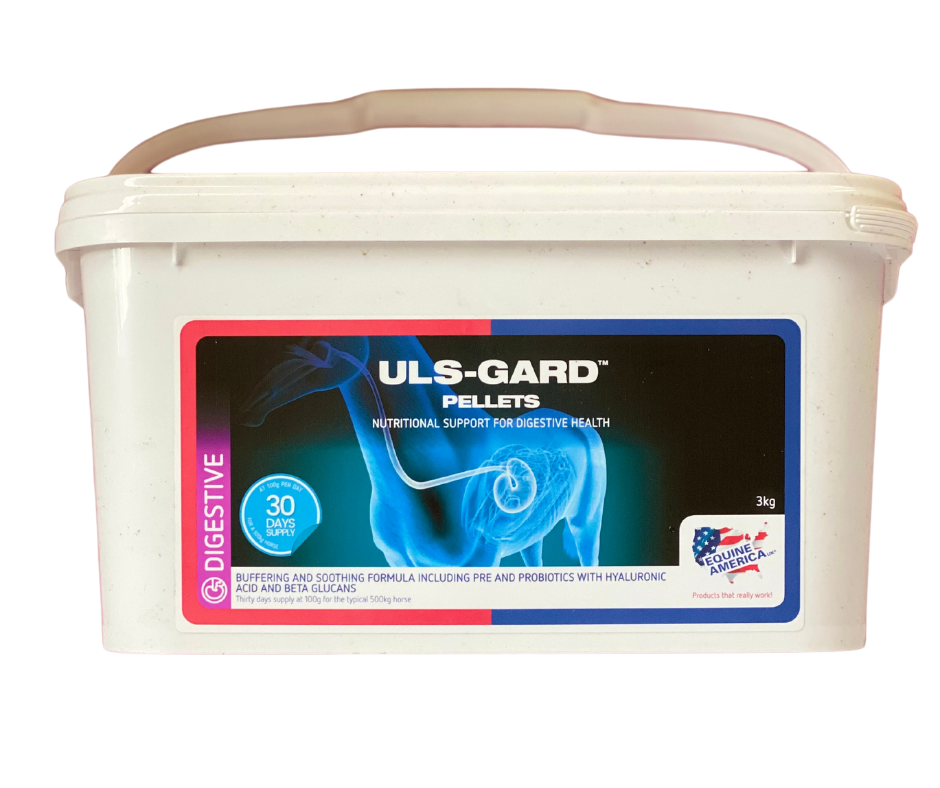Dirty Horse & Muddy Boots
Uls-Gard Pellets
Uls-Gard Pellets
Couldn't load pickup availability
-
Equine America Uls-Gard Pellets have been formulated using carefully selected ingredients to help maintain digestive and gastric health and comfort.
- Natural, nutritional support for gut health and comfort
Plan training and competition schedules carefully, especially where long-distance travel may result in restricted forage intake.
Palatable pellet and easy to feed even for fussy feeders. Suitable for foals at a reduced serving rate. For further advice please contact our technical team info@equine-america.co.uk
Management Tips for Gastric and Digestive Health:
Horses are designed to trickle feed – grazing for up to 16 hours a day. This means that they need to constantly secrete acid to help digest this almost continual source of food entering their stomach. A grazing horse will also produce up to 9 gallons of saliva a day which as well as lubricating the food, also acts to help maintain a healthy gastric pH.
The horse has a small stomach, and food does not stay in there for very long with constant stomach acid secretion, so even short periods during the day without access to forage should be minimised. Providing a small amount of forage, such as chaff, prior to exercise will also support gastric health and comfort. The physical fibrous food mat helps to prevent acid splashback onto the unprotected squamous mucosa.
There are a number of additional management tips which may also help support gastric health and comfort:
Turnout to grass where practical and possible, ideally with a placid companion, even if only for short periods. Try to provide periods of turnout or hand grazing to enable the horse to benefit from antioxidants in fresh green forage. Plan yard and field regimes to avoid social stressors such as bullying or excessive activity near the stable. Ensure ad-lib forage where practical. For good doers, where calories are restricted, offer very frequent, but controlled amounts of forage, ensuring no long ‘empty’ periods. Select clean, but low-calorie forage to enable larger amounts to be offered. Avoid high starch feeds and instead use a forage-based regime with digestible fibre sources and oil (e.g. Equine America Supreme Omega Oil) to provide additional energy. Offer forage in different locations around the stable to encourage natural foraging behaviour. Feed a good double handful (or 1 round scoop) of alfalfa chaff before exercise or competition warm-up to provide a fibrous "mat" in the stomach - even if forage is available in the stable or lorry. High nucleotide yeast to provide additional beta glucans as well as other beneficial compounds such as MOS, which help to increase the viscosity of stomach contents, and provide nutritional support for a healthy gastric mucosa. Glycine – to help support a healthy gastric mucosa (lining of the stomach). Alfalfa and soya hulls base to help provide a fibrous mat and to help maintain a healthy gastic pH. New updated formula to add Hyaluronic Acid and additional Beta Glucans at levels supported by research. High molecular weight Hyaluronic Acid to coat the stomach lining (mucosa). Beta Glucans benefit the gut microbiota and intestinal health, as well as supporting the immune system which is especially important before stressful events. Calcium and Magnesium from a slow-release marine algae from a sustainable source, to support a healthy gut pH. Prebiotics (FOS) and Probiotics (Saccharomyces cerevisiae) to support a healthy gut microbiome. Pectins and Lecithin help to provide a barrier on the upper unprotected stomach lining by producing mucilage. Lecithin is a special type of fat that helps to support healthy stomach lining cells. Liquorice and Marshmallow root traditionally soothe the stomach lining.
Share


